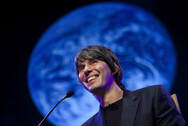 Scientists say the Uncertainty Principle is simply a case of not being able to take two measurements at the same time. Brian Cox called anyone who thought differently a "purveyor of tripe" . We are all unique - every grain of sand and snowflake being unique, has this nothing to do with Uncertainty? Seems likely to be a connection in there, and Heisenberg might even agree. Electrons are fuzzy things, not pinpointable because they zing their way round and through several dimensions at once and somehow land up here in this Universe just long enough to fend off the pesky Positrons. So not being able to pin down an electron, which is where this whole uncertainty-principle thing first started, is one thing. Not being able to pin down anything at all is, tbh, more like it. 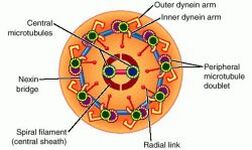 One life as we know it, Jim - all else is conjecture but it's good to know about Uncertainty. Where would we be without the U.P.? Here's a microtubule in the brain, best as we can picture it - this is the one place in the body you'll find coherent water, the incredible properties of which you can learn about behind the pic. Unless you're feeling really scientific, in which case you're going to love this... Look at the bigger picture - the Multiverse. Almost everyone now agrees with Everett, now that quantum mechanics has proved so many dimensions and variables to exist. That's a lot of Universes, mind, and a lot of options, probably stretching to Infinity if we could bring ourselves to face it, but Renormalisation is easier so..... back to the comfort zone. What for? Who doesn't want to know how to get the best out of what they've got? 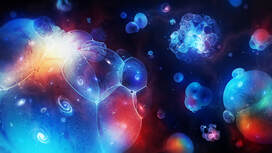 Time - on our side, with the Past and Future waves of Advance and Retard crashing into the Present at the same time and hey, doesn't it suddenly make sense that we're crazy, clever and making mistakes while we're waking up to Now and what we can do with it, somewhere our species hasn't really been before. At least not in living memory. Behind the bubbles you'll find Quanta Magazine saying much the same thing. What if we, like the electron, are buzzing in and out of Multiversal states all the time, without realising it? How can every thing be unique without infinite proportions to choose from? And that, extrapolated into our neural framework, means that we are freer to choose or not to choose than we were before, because knowing that both are necessary for our movement through Time allows us the pleasure of appreciation, the feeling of what it is to be happy with yourself, instead of beating ourselves up and crashing back into the pan of Past/Future Anxiety where everything loses its own plot.  The simplest things are binary, 1 and 0 making a code that replicates itself and can do so in infinite combinations any way anything wants it to, from computer programming to barcodes in simple versions of the way we do things. Binary suffices all requirements of data, and a lot of things in Nature tend to follow it - the fuzzy improbabilities of the electron and the probability that this table will still be here in the morning have some kind of relationship. They either are (1), or they are not (0). If we can be in so many places at once then why shouldn't identical snowflakes fall where no-one is watching them, and identical grains of sand appear in remote corners of the world where they can't be found? Commonality is the thing in the rarity of symmetry, because Nature is not fond of symmetry and scientists have long hated that. Back to Charnia, where the lions and witches had us wondering about our wardrobes..... but if you want Wiki's take it's right there behind the picture, where Life first began to take Form....
0 Comments
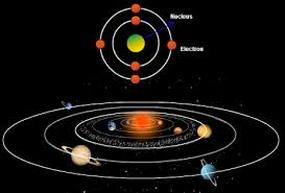 You've heard it said that we're made of this material, quarks and electrons, that atoms are the stuff of life - in due service to Relativity it seems fair to surmise that Micro and Macro correspond with each other. Over many arguments with physicists looms the division between our existence (in the large, macro world) and that of the quarks and electrons that comprise our bodily matter. If we're made of this stuff, then why don't we behave like it, just as the solar system behaves like an atom? Quoting the Quora page linked to the picture, “Every time someone says that the Universe (or even a star system, or a galaxy) is like a big atom, a cosmologist dies a bit inside”; so it is that scientists want to keep their compartments separated by all kinds of b*lls*it to make it look as though nobody could get the hang of it without a traditional Masters degree. The nucleus of the atom sits deep inside its compound, guarded by a ring-fence of electrons occupying 'shells'. Electrons rise and fall within this shell-system by absorbing and losing photons. If a source of energy (light) 'excites' the atom, electrons within it can climb to a higher shell, only to fall back to their original state in a short space of time. Of course, a short space of time for an electron might be much longer than we give credit for under the auspices of relativity, given that lifetimes are variable on this planet and a year for us is as an hour for a butterfly.  Let's say, for argument's sake, that we are like atoms (and solar systems, just to kill off a bit of a cosmologist) with a nucleus at the centre of Self, where resides that part of us unknown to others and barely acquainted with our own mind, where science and psychology break down - our Singularity. Then let's say that the electrons are as our states, which exist in 'shells' of positive and negative. Emotional states are sometimes described in terms of 'frequency', where a 'higher vibrational state' means more of a positive feeling. I feel this to be a bit of a misnomer, but I could well be wrong. It might indeed be that occupying a higher vibrational field corresponds to feeling good. Whatever it means, and wherever the analogy comes from, it sounds a bit like subatomic structure to me. In these terms we're looking at now, we can see a correlation between the structure of an atom and the structure of our Selves, from the essence of our being to the mental state we occupy. There's a lot of space between the nucleus of an atom and the electron shells around it. This example uses a baseball to illustrate the effect. In our analogy, the space between the core of the Self and the responses / reactions to stimuli we experience in relation to the outside world could be occupied by something we find very elusive. Scientists might find Dark Matter or Energy lurking around the space inside atoms, so let's suppose we have something equally mysterious filling the gap for us. We might call it the ID. The Yid? Let's settle for Ego. Everything that lives must surely have one. Without it, there would be no drive to make the most of circumstance, to ascend within a pack, to take on bigger prey, or to be inventive with ways to obtain food. The natural world could not exist without ego. This would mean that the state we occupy in subatomic terms corresponds to positive or negative feelings as regulated by the ego, the energy of the space in between inner and outer selves, and the incoming stimulus of the situation. Stepping up to the plate really means stepping up to the shell, and we only have to be confident in doing this - positrons gain ground when we make light work of it. Ego is only a bad thing when it smothers everything else, like too much ketchup on your breakfast. Sometimes we feel as though we've learned enough - what more can these shells do for us? Surely we've got to have dreams and follow them, otherwise we wouldn't be true to our star, or stars as the astrologers would have it, for starseeds we all are.... it's not a cultivated cult. We come from the same stuff, you and I, and of the stuff we're made of pretty much all is the same thing, given the uniqueness quotient thanks to the uncertainty principle. Stuff the rhetoric, Brian Cox. You said it all. 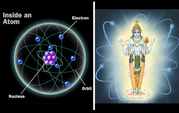 Just to recap on the diagram here. Electrons = Earthlings. Nucleus = Earth. Space (yellow?) = Ego. We can, if we want to, reach neutralisation, find a balance on the shell system and fit more easily with the balance of nature. Physically, our feet are usually touching the ground. As time shows us the truth of what we choose, and how little we get to do so, correspondence with natural law becomes more need-to-know. We know, now. The knowing is all around us. What do we do with what's next to come in on the current? |
AuthorKathy is the author of Quantumology. She met up with quantum mechanics in 1997, pledging allegiance to its sources thereafter. These are her personal thoughts and testimonies. Archives
April 2023
|
 RSS Feed
RSS Feed